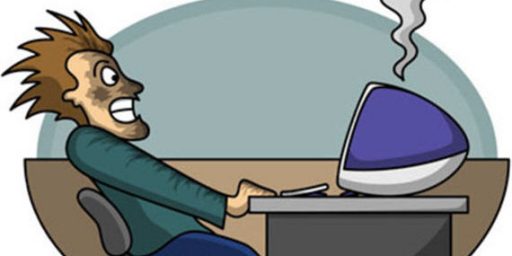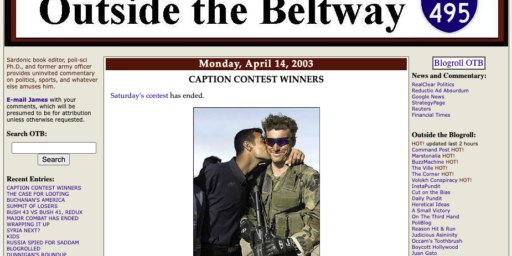‘Open and Free’ Compared to What?
The "open and free" Internet is an ideal type, not a myth.
Responding to the recurring debate about online comments sections, and particularly anonymous commentators, Purdue doctoral candidate and Dish guest blogger Freddie deBoer argues that “this is a good opportunity to finally let some of our old myths about the internet die. It’s still common to hear people talk about the internet as this open space where only talent matters and where everyone has a chance to impact the discussion. And it’s time we put those myths to bed.”
While sympathetic to the arguments against anonymous commenting and even comment sections themselves, deBoer doubts that we’ll actually solve online trolling, harassment, bigotry, and other problems at which these measures are aimed because “Humanity exists online, and this is the way humanity is.” Moreover, though, the economic and social realities of cyberspace belie the notion of a commons where the best ideas rise.
One of the things I’ve always liked about Matt Yglesias and Ezra Klein is that they’ve both always been upfront about the fact that their success depends in part on having been in the right place at the right time, and that building a career now is a lot harder than it used to be. Hierarchies harden, alliances form, and given the brutal economic realities of the online writing profession, the game of musical chairs gets more and more brutally competitive. The end result is, inevitably, that people feel more and more pressure to find a niche and to be liked. It’s a word of mouth business. And while the world of commenters may seem far from that of the pros, I think that many of us envisioned a future where commenters could, at their best, provide a kind of counterweight when professional and social pressures influence what the pros think and say.
[…]
[As]s I tried to say in the first piece I wrote this week: I don’t know that there’s such a thing as political and intellectual independence when there’s so little economic and labor security. The unemployment rate is down, but I don’t know many people who really feel secure. The terrible condition of the American worker spreads out into everything and hurts people in all industries- even those who would prefer to say, for political reasons, that everything is alright.
I don’t know if there was ever a time when the internet in general, and the world of blogging and online journalism specifically, were these open cultures where anyone truly had a chance to get ahead. And there’s a simple rejoinder to all of this: commenters never were some sort of principled check on bloggers and writers. They brought the rape gifs and the misogyny and the racism and none of the checks and balances. I get that, too. I just think that it’s time for us all to reckon with the fact that the mythology is well and truly dead. The internet is a social system, which means it’s defined by inequalities in power, and those inequalities determine what gets heard and by whom. I will never stop criticizing those writers who decide that they are a very big deal, or stop pointing out the social and professional hierarchies that they care about deeply while pretending they don’t. And as much as criticisms of comment sections are accurate, they are also self-serving, a way for the various Big Deals online to lord it over the proles. But I do hope that I always keep in mind the fact that structural, economic factors are ultimately to blame for our hierarchical, unequal media, not individuals. And that my own pretensions and self-aggrandizement are no kind of alternative.
While he’s certainly right about the inequities in the public discourse—and the linked piece on the demise of academic freedom for young academics is worthy of a conversation all its own—things aren’t quite so stark. It’s doubtless true that it would be much harder to get noticed as a budding blogger today than it was when Yglesias, Klein, Dan Drezner, Kevin Drum, Steven Taylor, and lots of others of us were getting started a decade plus ago. That’s true on Twitter as well. The media have matured and it’s simply harder to get noticed.
If one’s desire is to “Take the Boeing”—Glenn Reynolds’ coinage for getting hired to blog at a mainstream media site—there is enormous pressure to create a lot of content of the variety that generates clicks. Moreover, there’s a not-so-subtle pressure to either be bland—staying away from topics and opinions that might offend the sensibilities of the hiring elites—or at least predictable. It’s better to be easily identifiable as a Democratic or Republican partisan than a free thinker.
And, sure, there’s a power dynamic even at places like OTB. Top-line posters can set the agenda while commentators are mostly limited to talking about those topics selected by the posters. We can delete comments that offend our sensibilities and ban commenters who annoy us sufficiently while commentators can only comment or not.
So, no, the Internet is not completely “open” or “free.” It never was and never will be. But “open and free” is essentially an ideal type, not a promise. Compared to the offline world that predated it, the online world is quite open and free.
While again acknowledging that I had something of a first mover advantage kicking this blog off in 2003—I’ve been able to have substantially more impact on the conversation than I ever would have in a pre-Internet world. Hundreds of people read most of my posts. The blog has served as a launching pad for a fairly prolific editorial writing career at various prestige outlets. The fact that said outlets have expanded their available slots via their online presence has helped considerably in that regard.
Further, despite the limitations inherent in the system, aside from those who engage in blatant violations of our commenting policies “everyone” actually does have “a chance to impact the discussion.” We’re still small enough that, unless I’m just swamped with other tasks, I can read the comments on every post that I write. (Authors get each comment emailed to them. Thus, I read comments on my own posts but often not those on those of my colleagues.) From that interaction, I often either modify my views or am prodded to write subsequent posts further explaining them. It’s a real conversation, albeit not a completely equal one.
The world we live in is inherently unequal. Those with money and power have a much easier time finding a platform and getting their voices heard. The Internet and social media have had some substantial leveling effect on that; they haven’t upended reality altogether.







Open and Free compared to this.
In any event, I greatly appreciate this forum and hope that it never becomes a “premium” offering with my provider!
FWIW, although OTB comments are the only ones I read regularly and definitely the only ones I participate in, I suspect the site might be better without them. All too often they seem to devolve into racist diatribes from Superdestroyer and Eric Florack and with the human dynamic what it is, the people who simple can’t stop themselves from responding to them. I’m 12 hours time shifted from the US east coast, so when I wake up and see a 50 email thread in my inbox, I know I’ll get through at best a half dozen articulate comments before it’s taken over by that crew.
Kinda like the TeeVee has a channel changer and an off switch, you just don’t have to read them.
——
OT Alert.
Mr. Reynolds lives not far from today’s NoCal 6.0 earthquake epicenter. Hope all is well.
I disagree, the internet is open and free. Anyone can publish just about anything – it doesn’t get more open and free than that. Unequal outcomes are inevitable in any human enterprise and that fact doesn’t make the internet any less open or free.
Whenever you read anything by Freddie discussing comments, remember that he was traumatized by my comments section, where people had the temerity to question his posts and were sometimes downright rude and argumentative (shocking behavior at Balloon Juice) and failed to always respect his genius.
@ernieyeball:
We responded in blasé California style. Woke up, said, “Huh, that’s an earthquake.” We checked on the kids. Julia (14) slept straight through. Jake (17) comes in to say, “It was a six.” Went back to sleep.
Frankly, I felt even that might be an overreaction – you don’t get out of bed for a six.
James:
I actually thought about emailing DeBoer to point to this site. Also the vastly larger terrain of Reddit obviously does well with comments. And I’ve, um, been told that they have porn.
@MarkedMan:
I don’t really want to defend these guys, but “Don’t feed the trolls” should only apply to, you know, trolls.
SD and Florack are not immune to the occasional trolling fit, as outnumbered as they often are, but I think for the most part they are commenting from their own unique perspectives. They may be disagreeable, they may be racist at times, but I don’t think they rise to the level where they should be ignored completely.
NY rebublicans almost made it illegal to post online without using your real name and ip address—Introduced by New York State Sen. Thomas F. O’Mara (R—Big Flats), S6779 would require that any anonymous post online is subject to removal if the poster refuses to post — and verify — their legal name, their IP address, and their home address. From the bill:
“A web site administrator upon request shall remove any comments posted on his or her web site by an anonymous poster unless such anonymous poster agrees to attach his or her name to the post and confirms that his or her IP address, legal name, and home address are accurate. All web site administrators shall have a contact number or e-mail address posted for such removal requests, clearly visible in any sections where comments are posted.”
@michael reynolds: Thanks for the update.
I lived in SF for a year ’74-’75. There was a minor shake or two.
I visited the City in the spring of ’90 after Loma Prieta, a 6.9.
All I know is that I come here for Michael Reynolds as much as any of the top-line posters. I often actually just quickly skim the post and head straight to the comments.
Well, Michael Reynolds and a few others… Don’t want things to go to his head, and I wouldn’t want to leave out our beloved Superdestroyer.
A good shake, but no damage in the east bay. Napa got hit fairly hard, I have not been able to get in touch with my friends there yet.
@James Pearce: Oh, gee…. thanks, I think.
as to the net, I submit ‘open and free’ is an absolute, not a relative term. Less than open and free would by nature include forced ‘neutrality’
@bob: Yeah,the NY GOP is one reason Im a registered independant. the GOP in NY is indistinguishable from the Democrats. its bills such as what you mention that really stop me from supporting them. Im convinced the only hope is the Tea Party, or some other group. there is no saving these morons.
@John Cole: “Whenever you read anything by Freddie discussing comments, remember that he was traumatized by my comments section, where people had the temerity to question his posts and were sometimes downright rude and argumentative (shocking behavior at Balloon Juice) and failed to always respect his genius.”
Also, as was pointed out over on Balloon Juice, miscellaneous grad student Freddie DeBoer is getting his words in front of thousands of times the reads than he could have in 1994.